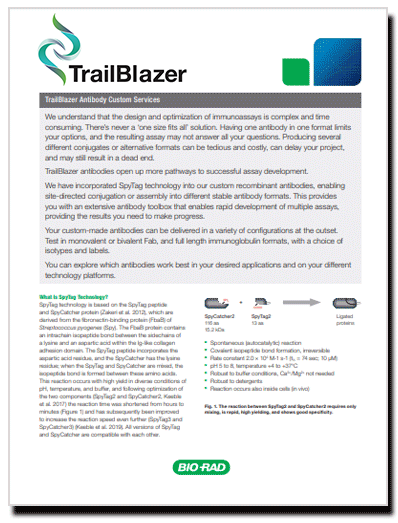Webinar: Five Ways to Control Your Critical Antibody Reagents and Avoid Bioanalytical Assay Failure
-
Monoclonal Generation
-
Custom Recombinant Monoclonal Antibody Generation
-
Webinars, Videos and Technical Articles
- Webinar: Overcome the Challenges of PK Assay Development Using TrailBlazer Antibodies
- Webinar: Generation of SARS-CoV-2 antibodies in multiple formats within four weeks
- Webinar: Recombinant Antibodies with SpyTag Technology
- Webinar: Transform bioanalytical assays with TrailBlazer Antibodies
- Webinar: Control your critical antibody reagents and avoid assay failure
- Webinar: Improve your antibody drug development assays
- Webinar: Optimize your assays using recombinant antibodies selected for desired affinity
- Webinar: The making of recombinant anti-idiotypic antibodies for high performance in bioanalytical assays
- Webinar: Human recombinant antibodies as positive controls and calibrators
- Webinar: How to overcome assay challenges using custom recombinant antibodies
- Webinar: Generation of high affinity recombinant antibodies for application in immuno-MRM
- Video: Generating anti-idiotypic antibodies for bioanalytical assays
- Video: Best practices for characterization and QC of anti-idiotypic antibodies for bioanalysis
- Video: Generation of drug-target complex specific antibodies
- Video: Antibodies for CAR-T cell therapy development
- Article: Monitoring antibody immune responses against biotherapeutic drugs
- Article: Effective tools for drug monitoring assays
- Article: An accelerated approach to sensitive ADA assays
- Article: Isolation of enzyme active site-specific recombinant antibodies by guided selection
- Article: Biomarker Assay Development using Highly Specific Recombinant Antibodies
- Article: Recombinant antibodies as standards for immunodiagnostic assays
- Article: High affinity antibodies for peptide enrichment immuno-MRM
- Article: Generation of antibodies against self-antigens
- Article: Generation and characterization of drug-target complex-specific antibodies
- Article: Antibodies for CAR-T Cell Therapy Development
- Poster: Faster Generation of Anti-Drug Antibodies Using SpyTag Technology
- Poster: CAR T cell analysis with modular antibodies
- Poster: Drug-Target-Complex Specific Antibodies for Pharmacokinetic Analysis of Biotherapeutics
- Poster: Characterization of anti-idiotypic antibodies for high performance in bioanalytical assays
- Poster: Recombinant anti-idiotypic antibodies for antibody drug development
- Poster: Generation of recombinant antibodies for Bio-Plex assays
-
Webinars, Videos and Technical Articles
-
Custom Recombinant Monoclonal Antibody Generation
The success of a bioanalytical ligand binding assay is significantly impacted by antibody quality. Using poorly characterized and controlled reagents can result in having to spend extra time reworking your assay or doing multiple validations, and can affect the translatability of data between phases.
Listen to this webinar to get insights into how to secure high quality, reproducible, and sustainable critical antibody reagents early in the development lifecycle, and avoid the frustrations and risks associated with assay development failure.
You will learn:
- The importance of sourcing high quality antibodies for ligand binding assays
- How a custom antibody can be designed specifically for your assay
- How conjugation can be controlled using SpyTag technology
- Key assays for characterizing antibody reagents
- How recombinant antibodies offer reproducibility and sustainability
This webinar is recommended for scientists seeking custom antibody reagents designed to target a large molecule biologic or biosimilar, and suitable for the development of pharmacokinetic and anti-drug antibody ligand binding assays.
Webinar: Five Ways to Control Your Critical Antibody Reagents and Avoid Bioanalytical Assay Failure
Presented by: Dr Paul Royle, Technical Sales Manager, Bio-Rad Laboratories
Speaker Biography:
 Paul Royle is the Technical Sales Manager for Bio-Rad’s Custom Antibody Service and has been with Bio-Rad’s antibody division for over 7 years. Prior to this, he worked in an immunology diagnostics company for almost 7 years. Paul holds a degree and PhD from the University of Nottingham (UK), and has post-doctoral research experience from the University of Warwick (UK).
Paul Royle is the Technical Sales Manager for Bio-Rad’s Custom Antibody Service and has been with Bio-Rad’s antibody division for over 7 years. Prior to this, he worked in an immunology diagnostics company for almost 7 years. Paul holds a degree and PhD from the University of Nottingham (UK), and has post-doctoral research experience from the University of Warwick (UK).
Resources
TrailBlazer Antibody Custom Services
Get more details about SpyTag technology, how it works with our antibody generation service, and see data for different experimental applications.





